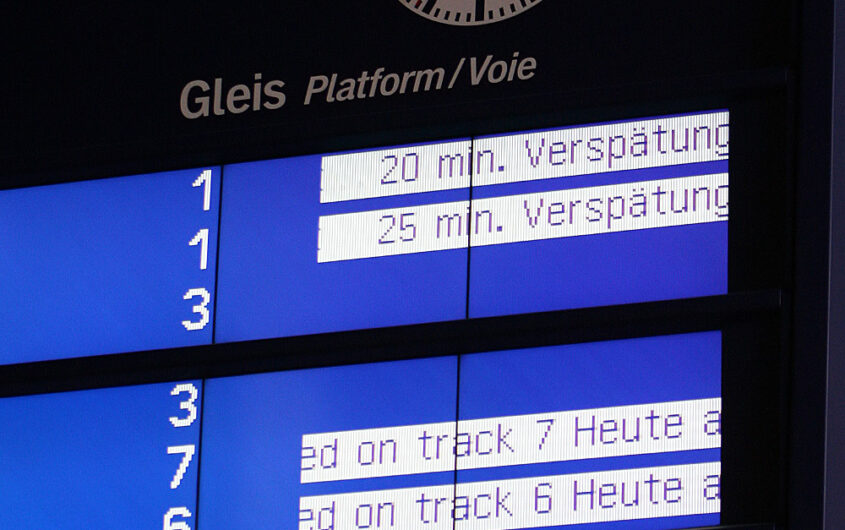
Sebastian Terfloth via Wikimedia Commons
A Losing Streak?

Katie Hausman
Halle Foundation/AGI Intern
Katie Hausman is a Halle Foundation/AGI Intern in summer 2024. She is a recent graduate from American University’ School of International Service where she received a BA in International Studies and minors in Environmental Science and German Language. Having studied European governance and environmental sustainability, she is excited to apply her interests to policy work in the transatlantic relationship between the United States and Germany. After her internship at AGI, Ms. Hausman will be a U.S. Teaching Assistant through Fulbright Austria for the upcoming school year. She is excited to interact with students abroad and practice the German language, even if it may be an Austrian dialect!
Deutsche Bahn’s Weaknesses Shine in the Euro 2024 Tournament
Cheers echo from inside the stadium to fans outside. People wave flags of their home team. National colors streak their faces. A saxophone player hypes up the crowd. But the party ends and people crowd onto the train platform to go home, not knowing that they will have to wait three hours for their train to arrive. It is quite the come-down from the excitement that fills the 2024 UEFA European Championship. Efficiency and punctuality are proudly lauded by Germans, so much so that these characteristics have become the German stereotype. However, Deutsche Bahn (DB), one of Germany’s hallmark companies, no longer satisfies the German standards as years of divestment and overloaded tracks have led to delays and cancellations across the country.
The Euro 2024 games have been plagued by Deutsche Bahn’s (DB) poor performance. After experiencing railroad delays to the England vs. Serbia game in Gelsenkirchen, a few fans walked the 3.7 mile (6 km) route to the stadium from the city center rather than possibly missing the match by waiting for the train. Trying to make it to a game on time seems like an ill-fated wish when one sees that only 63 percent of the DB trains arrived on time in May, with Austria and France boasting numbers above or near 90 percent. Some train stations herd fans through winding pathways, notoriously the Stuttgart Central Station, which has been under renovation since 2010 with estimated completion in 2026. With the games running smoothly themselves, all criticism is targeted at DB.
After fusing the railways of East and West Germany in 1994, DB was made into a private company with the German federal government as its sole shareholder. Other companies that had been privatized after German unification such as Deutsche Telekom and Deutsche Post successfully went public, but, per Germany’s constitution, the majority ownership of DB must stay in the hands of the German government. Where DB is responsible for maintaining the railroad, the German government is responsible for extending its network and repairing outdated lines. Simply speaking, DB has little incentive to maintain lines to a high standard because they can push the cost of repair onto the government once the lines are considered damaged or outdated, therefore saving DB maintenance costs. Effectively accumulating these costs on the taxpayer has led to long-term neglect for the country’s sole train carrier.
Historically, DB was a reliable transportation network; however, twenty years of misguided rail policy has led to present unpredictability. DB’s annual budget for construction and railroad upgrades was cut from 4 billion euros to 1.5 billion euros in 2004. Although the budget has since been slowly increasing, it lags behind other major railroad networks. Where Luxembourg and Switzerland invest around 575 euros per capita and 450 euros per capita in rail infrastructure respectively, Germany invests 114 euros. This failure to invest in modernization for over two decades leaves current railways overloaded and other track areas vulnerable to disrepair.
Deutsche Bahn’s critical place as the dominant form of transportation for athletes and fans across Germany has only highlighted its weaknesses, forcing the company to accelerate investment in its long-neglected railways.
The structure of DB lends itself to its involvement in international operations, with subsidiaries reaching across Europe and the world. Its Arriva subsidiary, for instance, carries travelers across ten European countries on buses while DB Schenker handles international land, sea, and air cargo. DB’s 2023 report found that DB Schenker had a 30 percent decrease in revenue, from 27.6 billion in 2022 to 19.1 billion in 2023. As of June 2024, DB has sold Arriva and is planning to sell DB Schenker in the second half of 2024 as DB looks to focus on its core domestic railway. Schenker could fetch between 12-15 billion euros to help DB cut its debt. DB’s attention to its international ventures has been a point of contention for German citizens whose tax money goes to DB, which in turn has not maintained its railways which has left people frustrated. This shift in structure could help DB refocus its concentration on its natural monopoly of domestic rail.
DB published its 2023 financial result in March 2024, recording an incredible net loss of 2.4 billion euros compared to 2022’s 227 million euros. The exponential growth in financial losses can be traced to higher interest paid, inflation-related cost increases, rises in personnel expenses, and multiple railroad strikes. While its losses were astounding, it still noted growth in ridership and investment since the pandemic. The company’s 2024 plan is the first to address its long-standing construction and modernization standstill, as it sets out to expand and upgrade more than 2,000 km of track, 2,000 switches, 150 bridges, and 1,000 stations with a budget of 16.4 billion euros. Focusing on high-performing corridors, repairs to the so-called Riedbahn between Frankfurt/Main and Mannheim will begin in July 2024. This 70 km section of track is the busiest in the country, used by 300 long-distance, freight, and local trains every day. By adopting a new strategy of completely closing a route to carry out all works in a period of a few months rather than continuing with the traditional method of shorter, more frequent closures to carry out long-term work, DB hopes to complete its renovations quickly and efficiently.
DB’s 2024 plan is the beginning of a modernization spree, as upgrades to the Hamburg-Berlin and Emmerich-Oberhausen routes will follow in 2025. These improvements align with their goals of digitizing the rail network; currently, 48 percent of all signal boxes are in a “poor, defective or inadequate condition.” The Germany-wide rollout of the European Train Control System (ETCS) is estimated to create 30 percent more capacity on the existing rail network, reducing overloaded lines.
The 2024 Euro tournament is not to blame for the chaos that currently characterizes Deutsche Bahn. The company’s critical place as the dominant form of transportation for both athletes and fans across Germany has only highlighted its weaknesses, forcing the company to accelerate investment in its long-neglected railways.
As Felix Dachsel, a columnist for Der Spiegel aptly said, “You can beat Germany, but you will lose to Deutsche Bahn.”







